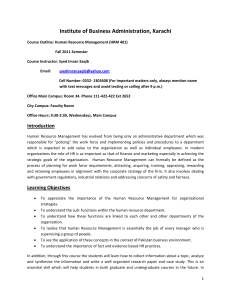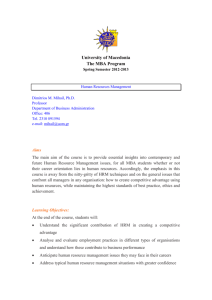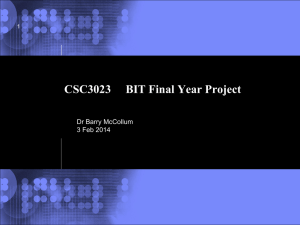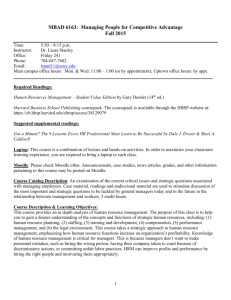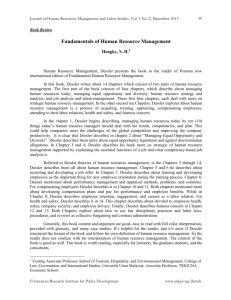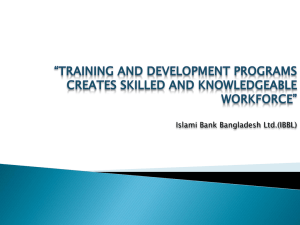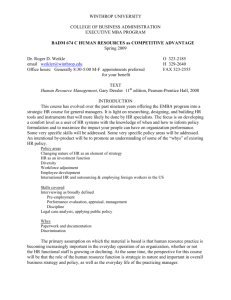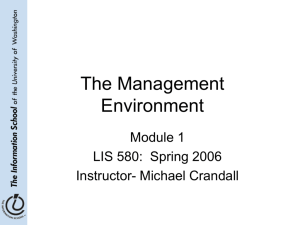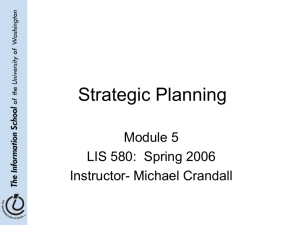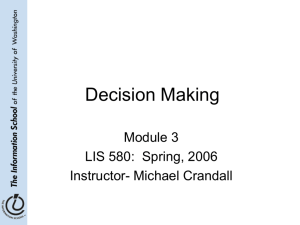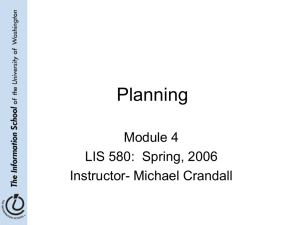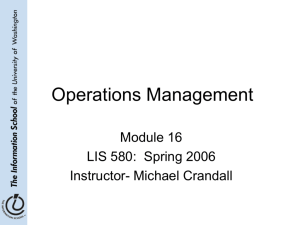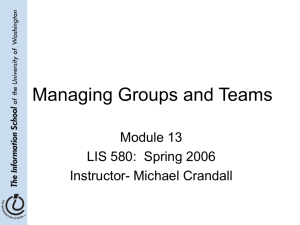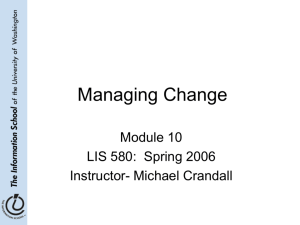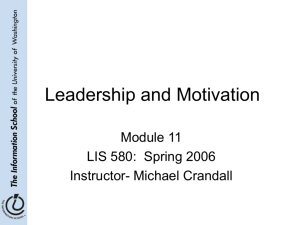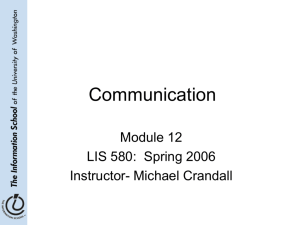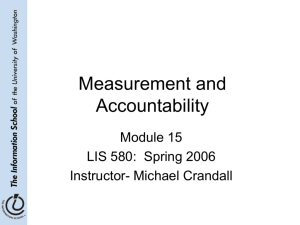EDL 280T - California State University, Fresno
advertisement
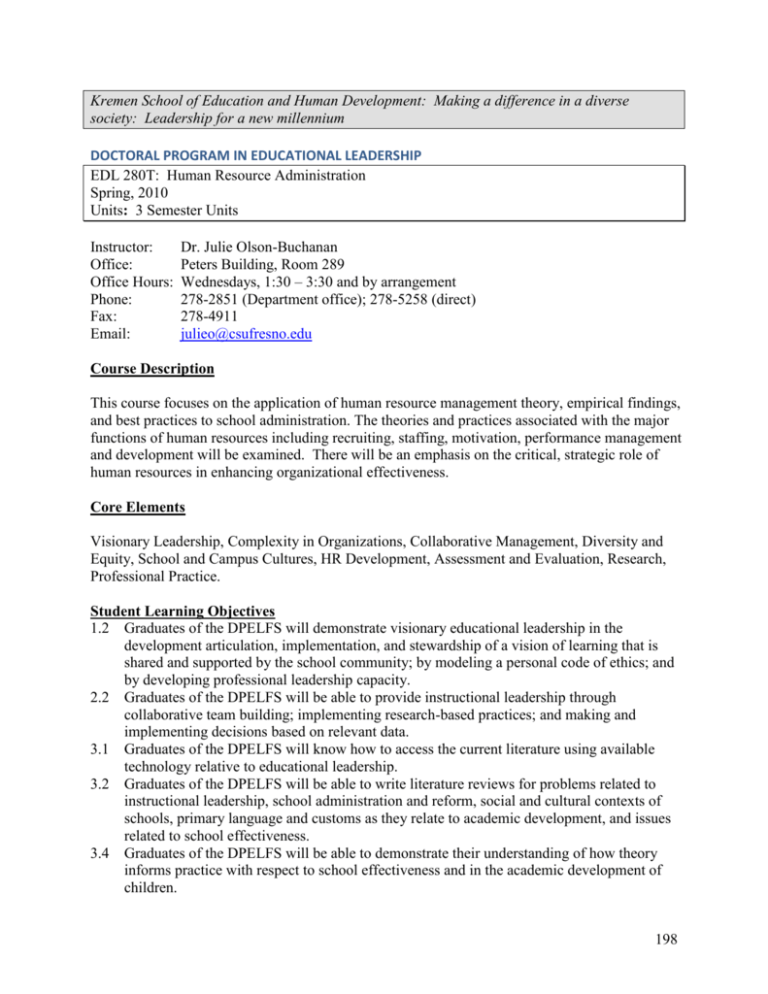
Kremen School of Education and Human Development: Making a difference in a diverse society: Leadership for a new millennium DOCTORAL PROGRAM IN EDUCATIONAL LEADERSHIP EDL 280T: Human Resource Administration Spring, 2010 Units: 3 Semester Units Instructor: Office: Office Hours: Phone: Fax: Email: Dr. Julie Olson-Buchanan Peters Building, Room 289 Wednesdays, 1:30 – 3:30 and by arrangement 278-2851 (Department office); 278-5258 (direct) 278-4911 julieo@csufresno.edu Course Description This course focuses on the application of human resource management theory, empirical findings, and best practices to school administration. The theories and practices associated with the major functions of human resources including recruiting, staffing, motivation, performance management and development will be examined. There will be an emphasis on the critical, strategic role of human resources in enhancing organizational effectiveness. Core Elements Visionary Leadership, Complexity in Organizations, Collaborative Management, Diversity and Equity, School and Campus Cultures, HR Development, Assessment and Evaluation, Research, Professional Practice. Student Learning Objectives 1.2 Graduates of the DPELFS will demonstrate visionary educational leadership in the development articulation, implementation, and stewardship of a vision of learning that is shared and supported by the school community; by modeling a personal code of ethics; and by developing professional leadership capacity. 2.2 Graduates of the DPELFS will be able to provide instructional leadership through collaborative team building; implementing research-based practices; and making and implementing decisions based on relevant data. 3.1 Graduates of the DPELFS will know how to access the current literature using available technology relative to educational leadership. 3.2 Graduates of the DPELFS will be able to write literature reviews for problems related to instructional leadership, school administration and reform, social and cultural contexts of schools, primary language and customs as they relate to academic development, and issues related to school effectiveness. 3.4 Graduates of the DPELFS will be able to demonstrate their understanding of how theory informs practice with respect to school effectiveness and in the academic development of children. 198 Course Objectives Students will be able to: Identify and understand the relevant theories and best practices associated with the major HR functions. Apply relevant theories and best practices to the management of people in school administration. Understand the strategic role of human resource management in organizational effectiveness. Identify and understand the legal and cultural context and challenges in which HR functions operate. Critically assess and evaluate human resource policies and practices. Administrator Dispositions The faculty of the KSOEHD fosters the development of the following professional dispositions: reflection, critical thinking, professional ethics, valuing diversity, collaboration, and life-long learning. Students will increasingly reflect these dispositions in their work with students, families, and communities. General Statements Students with special needs addressed by the American Disabilities Act who need course materials in alternative modes should notify the instructor and immediate reasonable efforts will be made to accommodate those special needs. Further information on policies regarding plagiarism, cheating, sexual harassment and student conduct can be found in the University Catalog and the Schedule of Courses. In the interest of safety, students are advised to leave the building in groups. University security escorts are available by calling 278-2132. Required Texts Dessler, G. (2009). A Framework for Human Resource Management (5th Ed.). Upper Saddle River, New Jersey: Prentice-Hall. Note: the 4th edition of this text is acceptable as well. Other Readings * Boswell, W.R., & Olson-Buchanan, J.B. (2007). The use of communication technologies after hours: The role of work attitudes and work-life conflict. Journal ofManagement, 33, 592610. Bowen, D.E., Cropanzano, R., & Gililand, S.W. (2007). The management of organizational justice. Academy of Management Perspectives, November, 34-48. 199 David, J.L. (2008). Teacher recruitment incentives. Educational Leadership, 4-2008, 84-86. Halpern, D, Reville, Grunewald (2008). Management and Legal Issues Regarding Electronic Surveillance of Employees in the Workplace. Journal of Business Ethics, 80, 175-180. Hudson, K. (2001). Transforming a conservative company: One laugh at a time. Harvard Business Review, July-August, 45-53. Kelley, C., Heneman, H., & Milanowski, A. (2002). Teacher motivation and school-based performance awards. Educational Administration Quarterly, 38(3), 372-401. Kerr, S. (1995). An academy classic on the folly of rewarding a, while hoping for b. Academy of Management Executive, 9(1), 7-14. Lee, D.M. (2005). Hiring the best teachers: Gaining a competitive edge in the teacher recruitment process. Public Personnel Management, 34(3), 263-270. Mack, C., Peterson, K.D., & Stevens, D. (2001). Presenting complex teacher evaluation data: Advantages of dossier organization techniques over portfolios. Journal of Personnel Evaluation in Education, 15(2), 121-133. Marshall, K. (2005). It’s time to rethink teacher supervision and evaluation. Phi Delta Kappan, 86 (10), 727-735. Munoz, M.A., Rinehart, J.S., & Winter, P.A.(2002). Principal recruitment: An empirical evaluation of a school districts internal pool of principal certified personnel. Journal of Personnel Evaluation in Education, 16(2), 129-141. Murnane, R., & Cohen, D. (1986). Merit Pay and the Evaluation Problem: Why Most Merit Plans Fail and a Few Survive. Harvard Education Review, 56 (1), 1-17. Oto, T., & Young, I.P. (2004). The impact of age for Asian, Hispanic, and Native American teacher candidates on principals’ screening decisions as viewed from a social distance perspective. Leadership and Policy in Schools, 3(4), 295-323. Pulakos, E.D., & Schmitt, N. (1995). Experience-based and situational interview questions: Studies of validity. Personnel Psychology, 48, 289-308. Smith, T.S. & Rowley, K. J. (2005). Enhancing Commitment or Tightening Control : The Function of Teacher Professional Development in an Era of Accountability. Educational policy 19(1), 126-154. Stansbury, K., Zimmerman, J. (2000). Lifelines to the classroom: Designing support for beginning teachers. WestEd, 2-17. *Readings may be modified based on student feedback. 200 Grading Policy & Assignments 1) HR Hot Topics in Education: 30 % a. Phase I (Individual) b. Phase II (Collaborative) 2) Literature review (Individual): 35 % 3) Reflection journal (Individual): 20 % 4) Participation (including online): 15 % HR Hot Topics in Education: 30 % Phase I: The first phase of the project is to design and conduct a structured interview with an HR manager or someone who performs a number of HR functions in the Education field (preferably Pre-K-12). The purpose of this interview is to identify what the interviewee considers to be the five “hottest” HR issues or concerns that he or she faces today. A short report (no more than two pages) that describes your method and results is due on February 23rd. This portion is worth 5 % of the grade. Phase II: In the second phase, you will present a 25-30 minute collaborative presentation (using PowerPoint) on one of the hot topics. Each group will select a “hot topic” from your combined interviews. The presentation should address (to the extent possible) the following questions: (1) Why is this topic important, from a strategic perspective, to organizational effectiveness in PreK-12? (2) What HR theories are relevant to this particular topic/issue? (3) What are the current HR best practices regarding this topic? (4) What information/research is lacking regarding this topic, as it relates to school administration? It is important to incorporate and cite appropriate research in your presentation. On the day of your presentation, please submit electronic and paper copies of the presentation and an annotated bibliography of the sources used for the presentation. An annotated bibliography should include summary, assessment, and reflection components. Please see http://owl.english.purdue.edu/owl/resource/614/01/ for a good description of these components as they relate to annotated bibliographies. The presentation is worth 20 % of the grade and the bibliography is worth 5 %. Literature Review: 35% The literature review assignment is to write a brief (9-11 pages, 1 inch margins, double-spaced, APA format) review of the literature of an HR topic, particularly as it relates to the Education environment. You should incorporate, to the extent it is available, relevant theoretical, empirical, and practitioner literature in the paper. The topic for the literature review should be approved by me by March 9th. The literature review should be based on one of the remaining topics (not chosen for Phase II) from your hot topics interview or else another topic you propose. The literature review is due 5:00 on April 30th (please send to me as an attachment or use the digital drop box in Blackboard). Reflection Journal: 20 % In this particular assignment, you are required to write about your reactions to the assigned readings, assignments, classroom and online discussion, lectures, guest speakers, and class exercises as they relate to the course objectives. 201 For example, in reflecting on the course readings, you could discuss what you find interesting about this topic, how it relates to your current job or career objective, what is perhaps unclear to you or not well understood in the literature on this topic, and flaws in the current state of research or thinking on the topic. You should feel free to offer your “informed opinion” and relate it to your personal experiences. In other words, it should not simply be a summary of that topic. You will need to work on this particular assignment throughout the course and are expected to make at least 10 journal entries (about 1 page, double spaced each). The journal will be graded with respect to the appropriateness, rigor, and depth of your reflections. Entries should be wellwritten and well-organized, otherwise they will detract from the content of your message. The final document should be in a Word document and sent to me as an attachment by May 14th. Participation: 15 % As with most doctoral seminars, the quality of the course is directly related to the quality of class discussion. Consequently, students are expected to attend class, read all assigned literature prior to class, and actively contribute to in-class discussion. Effective and worthwhile participation includes contribution of comments that demonstrate knowledge and integration of the assigned readings, building on responses of others, and critical, but respectful analysis of others comments. In addition, for the online component particularly, “timing” is an important dimension of participation. For the times when we are using online discussion, it is important to post comments throughout the discussion period. Lecture Topics (Note: Readings may be modified based on student feedback). Session 1: January 26 (first day of class 4:00 – 6:50 p.m.) Introduction to Human Resource Management Strategic Management Dessler: Chapter 1 Session 2: February 9 (4:00 – 9:50) HRM Legal Context Recruitment Dessler: Chapters 2 & 3 Winter, Rinehart & Munoz, 2002 David, 2008 Lee, 2005 Session 3: February 23 (4:00 – 9:50) Selection & Staffing Dessler: Chapter 4 Young & Oto, 2004 Pulakos & Schmitt, 1995 202 HR Hot Topics Phase I Reports due Session 4: March 9 (4:00 – 9:50) Induction, Socialization & Development Dessler: Chapter 5 Smith & Rowley, 2005 Stansbury & Zimmerman, 2000 Session 5: March 23 (4:00 – 9:50) Performance Management Dessler: Chapter 6 Marshall, 2005 Peterson, Stevens & Mack, 2001 HR Topics Phase II Presentations Session 6: April 13 (4:00 – 9:50) Motivation & Compensation Dessler: Chapter 7 Kelley, Heneman, & Milanowski, 2002 Murnane & Cohen, 1986 Kerr, 1995 HR Topics Phase II Presentations Session 7: April 27 (4:00 – 9:50) Fairness, Discipline & Voice Dessler: Chapter 8 Cropanzano, Bowden, & Gilliland, 2007 Halpern, Reville, & Grunewald, 2008 HR Topics Phase II Presentations Literature review due April 30th, 5:00 pm Session 8: May 11 (4:00 – 9:50) Safety, Stress, & Work-Life Balance Dessler: Chapter 10 Boswell & Olson-Buchanan, 2007 Hudson, 2001 Journals due May 14th, 5:00 pm 203
